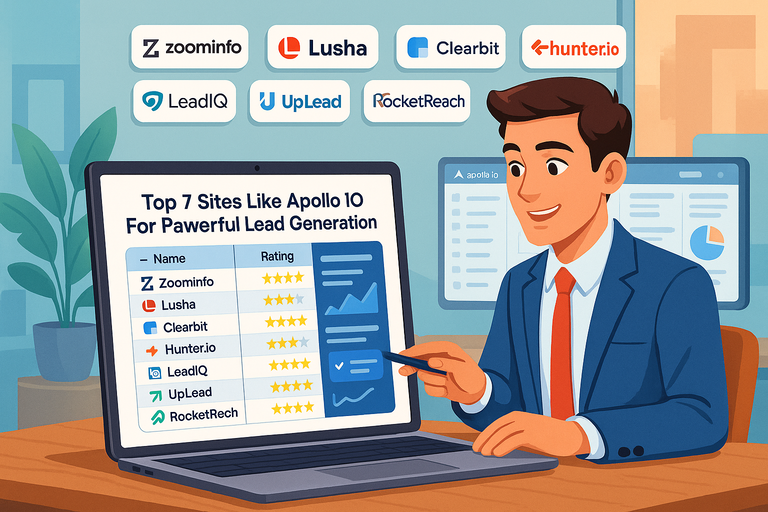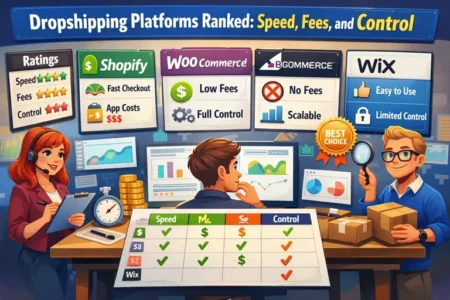Table of Contents
If you’ve been searching for powerful sites like Apollo IO to supercharge your lead generation, you’re not alone. Apollo IO has earned its reputation as a go-to platform for sales intelligence, but what if you need something more tailored, affordable, or feature-rich?
Whether you’re aiming for deeper B2B insights, faster prospecting, or smarter automation, there are some exceptional alternatives worth exploring. So, which tools truly rival Apollo IO in both data quality and performance?
Let’s uncover the top contenders that can take your lead generation game to the next level.
1. ZoomInfo: Best For Enterprise-Level Lead Intelligence
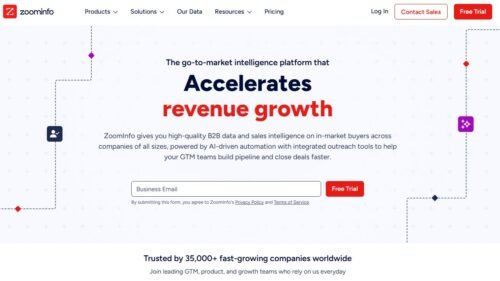
When it comes to enterprise-level lead generation, ZoomInfo is one of the most trusted names out there.
If you’ve used Apollo IO and loved its data depth but need something more expansive and predictive, ZoomInfo might feel like leveling up to a professional-grade toolset.
Comprehensive B2B Contact Database For Large Teams
ZoomInfo is built around one of the largest and most accurate B2B databases on the market — over 235 million business profiles and 100 million company records. That scale matters if your sales or marketing team is managing thousands of accounts across multiple industries.
What makes ZoomInfo especially powerful is data granularity. You’re not just getting names and emails; you get org charts, department sizes, decision-maker roles, technologies used by each company, and even job postings that hint at business expansion.
For example, imagine you’re targeting mid-market SaaS companies hiring new marketing directors. ZoomInfo lets you filter by “Company Type → SaaS,” “Job Title → Marketing Director,” and “Company Size → 200–500 employees.” Within seconds, you have a clean list of purchase-ready leads aligned with your ICP (ideal customer profile).
This precision saves hours of manual research and ensures that marketing and sales teams spend their time on real prospects rather than blind outreach.
Advanced Intent Data To Identify Purchase-Ready Leads
Here’s where ZoomInfo really flexes its muscle: intent data. The platform tracks behavioral signals from millions of online interactions—things like content downloads, search queries, and product comparisons—to reveal when a company is showing signs of active buying intent.
Think of it like catching a potential buyer mid-thought. You can literally see that “Company X” has been researching CRMs for the past two weeks. Armed with that knowledge, your team can reach out with the perfect pitch at the perfect time.
I personally find this feature transformative for enterprise teams. It turns lead generation into a data-driven prediction engine rather than guesswork.
CRM Integrations For Streamlined Sales Workflows
ZoomInfo integrates natively with CRMs like Salesforce, HubSpot, and Microsoft Dynamics. That means your data flows automatically — no messy imports or exports.
In practice, this looks like: Salesforce → ZoomInfo → Outreach Tool → Email Campaigns.
Each stage stays updated in real time.
The benefit here is workflow fluidity. Sales reps can identify a lead, sync their contact details directly into Salesforce, and launch a personalized campaign in minutes.
If your sales operations involve multiple stakeholders or departments, these integrations keep everyone aligned without manual intervention.
Why ZoomInfo Outperforms Apollo IO For Large-Scale Prospecting
While Apollo IO offers strong data and automation, ZoomInfo’s edge lies in data depth, intent precision, and scalability.
Apollo excels in affordability and usability for small to mid-size teams, but ZoomInfo dominates when the stakes (and lead volumes) are high.
Here’s a quick comparison snapshot:
| Feature | ZoomInfo | Apollo IO |
| Database Size | 235M+ profiles | ~270M contacts (less verified enterprise data) |
| Intent Data | Proprietary tracking via Bombora & Clickstream | Limited third-party intent |
| CRM Integration | Deep Salesforce & HubSpot integration | Strong, but lighter automation |
| Ideal For | Enterprise sales, ABM, and large B2B orgs | SMBs, startups, and mid-market sales teams |
If your sales strategy involves Account-Based Marketing (ABM) or you’re coordinating large global outreach, ZoomInfo is the more strategic choice. It’s expensive, yes, but its accuracy and predictive data can pay for itself in closed deals.
2. Lusha: Simplified Prospecting For Small To Mid-Size Teams
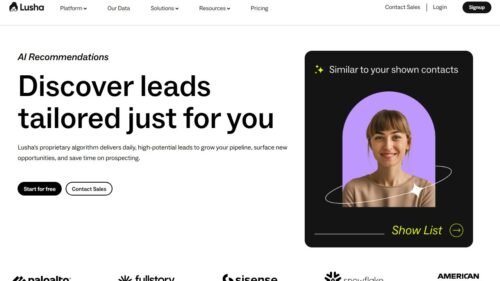
If ZoomInfo feels like a fully stocked corporate war room, Lusha is your sleek, easy-to-handle toolkit for fast, reliable prospecting.
It’s one of the most user-friendly sites like Apollo IO, designed to help smaller teams find verified contact information without complex setup or steep pricing.
Accurate Direct Dials And Verified Email Data
Lusha’s biggest strength is its simplicity and precision. The platform provides direct phone numbers and verified business emails for decision-makers, with verification rates above 90%.
You can search by company, title, or LinkedIn profile and instantly get contact details. The accuracy is backed by a “data confidence score,” which gives you a quick read on how reliable each record is.
In my experience, Lusha’s focus on quality over quantity works best for small teams who value efficiency. You won’t find the massive database of ZoomInfo, but you’ll get leaner, cleaner data that’s ready to use.
Browser Extension For Instant Prospect Discovery
Here’s where Lusha shines in real-world sales workflows. Its Chrome extension overlays directly on LinkedIn or company websites. While browsing a profile, you can simply click the Lusha icon and retrieve verified contact details in seconds.
No need to export lists or toggle between multiple tabs — your outreach starts right where your research happens.
Example Workflow:
- Visit a LinkedIn profile of a target lead.
- Click the Lusha icon.
- Get direct contact info (email + phone).
- Add it to your CRM with one click.
For fast-moving sales reps or founders doing their own outreach, this saves hours of manual data entry.
Flexible Pricing For Growing Businesses
Lusha operates on a credit-based pricing model, meaning you pay only for the number of contacts you unlock. Plans start affordably, and you can easily scale as your team grows.
This flexibility makes it a great Apollo IO alternative for startups or small agencies that can’t justify enterprise-level pricing. You can start small, test the waters, and upgrade as your prospecting needs expand.
Additionally, the free plan gives you a handful of credits each month, which is perfect for testing the platform’s accuracy before committing.
When To Choose Lusha Over Apollo IO
Apollo IO and Lusha often attract similar users, but they serve slightly different needs. If you’re looking for a simple, no-frills, accurate data tool that’s quick to learn and deploy, Lusha is the better fit.
Here’s a side-by-side comparison:
| Feature | Lusha | Apollo IO |
| Ease of Use | Extremely beginner-friendly | Moderate learning curve |
| Contact Accuracy | 90%+ verified data | 80–85% verified |
| Browser Extension | Instant LinkedIn prospecting | Requires manual search |
| Best For | Small–mid teams, agencies | SMBs, growth teams, SDRs |
| Pricing | Flexible, credit-based | Subscription model |
In short: choose Lusha if you want to move fast, validate leads quickly, and operate lean. Choose Apollo IO if you’re ready for a more robust sales engagement platform with built-in automation.
Pro Tip: If you’re using LinkedIn Sales Navigator, pairing it with Lusha can create a highly efficient lead discovery system — you find your prospects via Sales Navigator filters, then instantly extract verified contacts using Lusha’s Chrome extension.
3. Clearbit: Real-Time Data Enrichment For Smarter Marketing
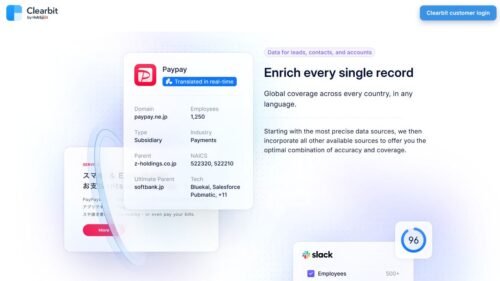
Clearbit is one of the most powerful sites like Apollo IO if your goal is to create smarter, more personalized marketing campaigns.
What makes it stand out is how it turns anonymous data into actionable insights—helping you understand who is visiting your website, what they care about, and when they’re most likely to buy.
Instant Lead Enrichment From Multiple Data Sources
Clearbit enriches your leads instantly by pulling data from over 250 public and private sources—things like LinkedIn, Crunchbase, WHOIS, and job boards. The result?
Every new lead that enters your CRM or marketing system automatically comes with a complete profile: company size, industry, role, and even technology stack.
Here’s a simple example: Imagine someone fills out a short form on your website with just an email address. Clearbit immediately enriches that record to tell you that the person is a Marketing Director at a 200-person SaaS company using HubSpot.
That’s powerful context—you can now tailor your follow-up messaging based on their company type and size.
I recommend using Clearbit’s Reveal feature if you run ads or personalized landing pages. It identifies anonymous web visitors in real time, letting you adjust what they see (for example, swapping out “Startup Plans” for “Enterprise Solutions” automatically).
Seamless Integration With HubSpot And Salesforce
Clearbit integrates beautifully with HubSpot, Salesforce, and Marketo—and I mean beautifully. Once you connect it, your lead records get enriched automatically, so you’re not stuck manually entering details.
A typical workflow looks like this: Clearbit → HubSpot → Email Automation.
When a new contact enters HubSpot, Clearbit fills in missing data fields, and your automation rules trigger based on that enriched information.
This is incredibly useful for marketing segmentation. For instance, you can set up HubSpot workflows that say, “If company size > 500 employees → enroll in enterprise drip sequence.” Clearbit ensures that kind of logic actually works because your contact data is complete from day one.
API-Driven Personalization For Targeted Campaigns
If your marketing or engineering team likes building custom solutions, Clearbit’s API gives you almost unlimited flexibility. You can dynamically personalize emails, website copy, or ads based on visitor data.
Here’s a quick example:
Your landing page headline could automatically update from
“The #1 CRM for Small Businesses”
to
“The #1 CRM for SaaS Companies Like Yours”
— all powered by Clearbit’s enrichment data through its API.
It’s a subtle touch, but personalization like that has been shown to increase conversion rates by 20–40%.
How Clearbit Enhances Lead Quality Beyond Apollo IO
While Apollo IO focuses on building contact lists and automating outreach, Clearbit focuses on data depth and precision. It’s not just about finding leads—it’s about understanding them deeply so you can communicate more effectively.
Here’s a side-by-side comparison:
| Feature | Clearbit | Apollo IO |
| Data Focus | Real-time enrichment | Prospecting and outreach |
| Integrations | Deep with HubSpot, Salesforce | Broad but less native |
| Ideal For | Marketers and data-driven sales teams | SDRs and sales reps |
| Pricing | Usage-based API model | Subscription-based |
If your marketing relies heavily on personalization and segmentation, I suggest using Clearbit alongside Apollo IO rather than replacing it. Apollo helps you build the list; Clearbit helps you truly understand it.
4. Hunter.io: The Expert Tool For Email Outreach
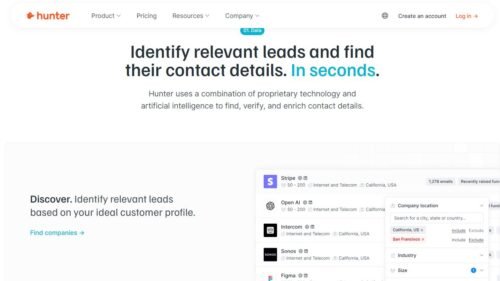
Hunter.io is one of my favorite sites like Apollo IO when it comes to finding and verifying emails with surgical precision.
It’s designed for marketers, recruiters, and founders who want to reach out directly without wasting hours guessing email formats or worrying about high bounce rates.
Email Finder And Verifier For Cold Outreach Accuracy
Hunter.io’s Email Finder is its star feature. You can search by company name or domain and instantly find professional email addresses tied to that organization.
It also offers an Email Verifier, which checks whether those emails are valid before you hit send—helping you maintain a healthy sender reputation.
Let’s say you want to email the head of operations at Shopify. Just type “Shopify.com” into Hunter’s Email Finder, and it’ll return structured results like:
• jane.doe@shopify.com – Operations Manager (Verified)
• contact@shopify.com – Generic (Unverified)
I’ve found that combining both features reduces bounce rates by 25–30%, especially for cold outreach campaigns.
Bulk Domain Search For Fast List Building
If you’re scaling your outreach, Hunter.io’s Bulk Domain Search is a huge time-saver. You can upload a list of domains (like 100 companies from a spreadsheet), and within seconds, Hunter returns hundreds of verified contacts categorized by job role and department.
You can also download these results as a CSV file or sync them directly to HubSpot or Google Sheets. It’s a simple, clean workflow that’s perfect for teams without heavy automation stacks.
One trick I often suggest: Pair Bulk Domain Search with LinkedIn Sales Navigator. First, export a list of target companies from LinkedIn, then use Hunter’s bulk search to pull real contact info. You’ll have a verified outreach list in minutes.
Simplified User Interface Ideal For Startups
Hunter.io wins big on simplicity. The dashboard is minimal, intuitive, and doesn’t overwhelm you with unnecessary analytics. You see exactly what you need: a search bar, filters, and results.
If you’re new to lead generation, I’d argue Hunter has the gentlest learning curve among all tools in this list. No complex setup, no integrations required to get started—just search and go.
For early-stage founders or freelancers doing their own sales, Hunter.io is an absolute time-saver. You can even install its Chrome extension to find verified emails directly from LinkedIn profiles.
Why Hunter.io Is Perfect For Teams Focused On Email Prospecting
Hunter.io is built for one purpose—precise, verified email outreach. Apollo IO offers more features, sure, but if your team’s main priority is direct email connection, Hunter wins in simplicity, accuracy, and cost-effectiveness.
| Feature | Hunter.io | Apollo IO |
| Email Verification | Best-in-class accuracy | Included, less transparent |
| UI Simplicity | Extremely beginner-friendly | Complex for new users |
| Data Depth | Focused on email-level data | Broader contact intelligence |
| Best For | Cold email outreach & list building | Sales automation & engagement |
I usually recommend Hunter.io as a first step for teams who want to validate their lists before moving them into Apollo or Outreach. It’s fast, affordable, and gets the fundamentals right.
5. LeadIQ: The Modern Prospecting Tool For Sales Teams
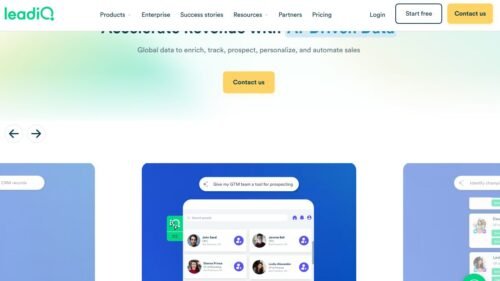
LeadIQ is a modern prospecting tool that feels built for the way sales reps actually work today—on LinkedIn, in CRMs, and across multiple channels.
It’s one of the best sites like Apollo IO if your focus is capturing leads in real time and syncing them seamlessly into your sales tools.
Real-Time Lead Capture From LinkedIn And Web Platforms
LeadIQ makes prospecting ridiculously easy. When you’re browsing LinkedIn, you can open its Chrome extension, click “Capture,” and instantly pull verified contact data (name, title, company, email, phone) into your CRM.
Here’s how the workflow usually looks:
- Open a LinkedIn profile of your target lead.
- Click LeadIQ Capture.
- The tool fetches accurate contact data and adds it directly to Salesforce or HubSpot.
It’s fast, intuitive, and eliminates manual copy-paste. I recommend it especially for SDRs (sales development reps) who prospect daily.
Smart Syncing With Salesforce, HubSpot, And Outreach
LeadIQ integrates deeply with Salesforce, HubSpot, Outreach, and SalesLoft, so once you capture a lead, their information is automatically formatted and synced. You can even tag or categorize contacts for follow-up sequences right from the LeadIQ panel.
This kind of “smart syncing” keeps your CRM clean and prevents duplicate entries—something every sales manager appreciates.
If you’re managing outbound teams, it ensures reps spend more time connecting with leads and less time managing spreadsheets.
Data Compliance And Accuracy You Can Trust
LeadIQ takes data compliance seriously, adhering to GDPR, CCPA, and SOC 2 standards. In an age where privacy regulations keep tightening, that’s no small thing.
I like that LeadIQ provides a confidence score for each contact record, so you can see how reliable the data is before reaching out. It’s not just about having more contacts—it’s about trusting the ones you have.
How LeadIQ Competes With Apollo IO On Workflow Automation
Apollo IO is broader in its capabilities—it’s part CRM, part automation platform. LeadIQ, on the other hand, is laser-focused on prospecting speed and CRM syncing.
Here’s a quick breakdown:
| Feature | LeadIQ | Apollo IO |
| Prospecting Source | LinkedIn, websites | Apollo database |
| CRM Integration | Deep (Salesforce, HubSpot) | Strong but not as seamless |
| Automation | Basic tagging & sequences | Full campaign automation |
| Ideal For | SDRs and B2B sales teams | Growth and marketing teams |
If your team’s main goal is to find and capture leads efficiently without managing heavy automation flows, LeadIQ is perfect. I’ve seen teams cut their research time in half simply by switching to it.
Expert Tip: Try pairing LeadIQ with Outreach or SalesLoft. Capture leads from LinkedIn using LeadIQ, and then sequence them automatically through personalized email cadences in Outreach. It’s a clean, modern workflow that keeps your pipeline moving fast.
6. UpLead: Verified B2B Leads With 95% Accuracy Guarantee
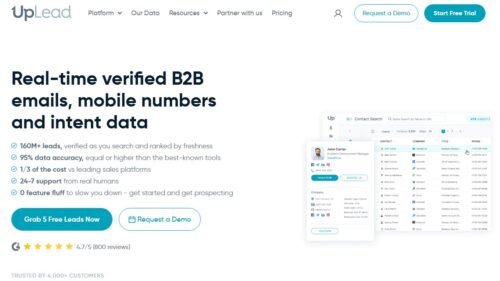
UpLead is one of the most reliable sites like Apollo IO for anyone who values precision over volume. It’s built for sales and marketing teams that want verified B2B contact data—without wasting money on outdated or bounced emails.
What makes UpLead stand out is its real-time data verification system, which ensures your leads are always accurate and active.
Real-Time Data Verification To Prevent Bounces
One of the biggest frustrations in B2B outreach is sending emails that bounce back. UpLead’s real-time email verification solves that. Before you even download or export a lead, the system checks its validity live—so you’re never wasting credits or damaging your sender reputation.
Let’s say you’re building a list of IT managers in the healthcare sector. As you select contacts, UpLead displays a green shield icon next to verified emails. That simple visual cue means your message will land where it’s supposed to.
According to the company’s internal data, UpLead maintains 95% data accuracy, which is significantly higher than most lead databases. From my experience, that difference translates to cleaner campaigns, better response rates, and happier inboxes.
Advanced Filtering For Niche Audience Targeting
If you’re running very targeted campaigns—say, “HR directors in SaaS companies with under 200 employees”—UpLead’s advanced search filters make that kind of segmentation effortless.
You can filter by 50+ criteria, including company revenue, technologies used (like “Salesforce” or “Slack”), industry, and job title.
Here’s a simple example:
Filter path: “Industry → SaaS,” “Employee count → 51–200,” “Job Title → HR Director.”
Within seconds, UpLead generates a list of verified contacts that match your exact ICP (Ideal Customer Profile).
This level of filtering is what makes UpLead particularly useful for Account-Based Marketing (ABM) teams or agencies that serve niche clients. I recommend it for smaller teams that don’t have the bandwidth for manual list cleaning.
Chrome Extension For On-The-Go Prospecting
UpLead’s Chrome extension adds a handy layer of speed to your research process. When you’re browsing LinkedIn or a company’s website, you can click the UpLead icon to reveal verified contact details right on the page.
It’s a workflow similar to Apollo IO’s LinkedIn integration, but with real-time verification built in.
Here’s what that looks like:
- Visit a company’s LinkedIn page.
- Click the UpLead Chrome icon.
- Instantly see verified contacts at that company—emails, phone numbers, and job titles.
For sales reps who live inside LinkedIn, this saves hours of manual prospecting. You can add leads to lists or export them directly into your CRM with a single click.
UpLead vs. Apollo IO: Which Offers Better ROI For SMBs
Both UpLead and Apollo IO are strong contenders for lead generation, but they serve slightly different needs. UpLead focuses on data accuracy and simplicity, while Apollo shines with automation and campaign management.
Here’s a quick side-by-side comparison:
| Feature | UpLead | Apollo IO |
| Email Verification | Real-time, 95% accuracy | Post-download checks |
| Ease of Use | Clean, beginner-friendly UI | More complex, feature-heavy |
| Filters & Segmentation | 50+ advanced filters | Strong, but less granular |
| Pricing | Pay-as-you-go or monthly plans | Monthly subscription only |
| Best For | SMBs, agencies, and ABM teams | Growth teams and SDRs |
If you’re an SMB focused on high deliverability and niche targeting, UpLead will likely give you better ROI. Apollo may have more features overall, but UpLead’s reliability means fewer wasted emails, higher engagement rates, and cleaner CRM data.
7. RocketReach: Multi-Channel Lead Generation Simplified
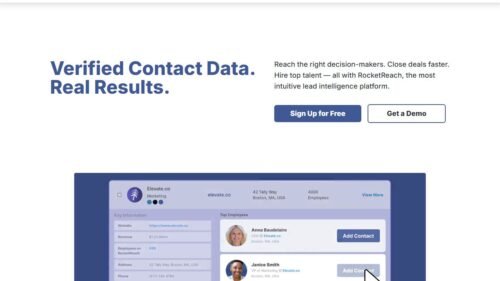
RocketReach has become one of the fastest-growing sites like Apollo IO, known for its massive contact database and simple, affordable pricing.
What makes it unique is how it combines email, phone, and social data into one easy-to-use platform—perfect for teams that want multi-channel outreach without complexity.
Access To Over 700 Million Professional Profiles
RocketReach’s scale is impressive. The platform claims access to 700 million+ profiles across 35 million companies worldwide. Whether you’re targeting small startups or Fortune 500 enterprises, you’ll find verified contacts across multiple roles and departments.
You can search by company, job title, location, or even keywords. For example, if you’re looking for “Marketing Managers at eCommerce companies in Germany,” RocketReach’s advanced search makes it a quick process.
I suggest using RocketReach’s Bulk Lookup if you need to build a list fast. Upload a spreadsheet of company names or domains, and it will automatically find verified contacts for each.
Deep Insights Across Email, Phone, And Social Channels
What sets RocketReach apart from Apollo IO is its multi-channel data. You don’t just get emails—you also get direct phone numbers and LinkedIn profiles for many contacts. That’s invaluable for sales reps who mix calls, emails, and social touches in their outreach.
For example, a recruiter could pull up a candidate’s email, phone, and Twitter handle all from one dashboard. This unified view helps you personalize outreach across different platforms without switching tools.
RocketReach also tags each contact with a confidence score, giving you a quick read on how reliable the data is before you reach out.
Built-In Analytics To Track Outreach Performance
While RocketReach doesn’t replace a full CRM, it offers simple analytics and activity tracking that show how your outreach is performing. You can see metrics like:
• Email open rates
• Response trends
• Top-performing campaigns
These insights help you understand what’s working and where to adjust. For small teams or solo founders, it’s enough to manage outreach without investing in heavier sales software.
If you’re running larger-scale operations, RocketReach integrates smoothly with tools like Zapier, HubSpot, and Salesforce, making it easy to automate data syncing and reporting.
Why RocketReach Is A Powerful Yet Affordable Apollo IO Alternative
If you love Apollo IO’s contact depth but need something simpler and more budget-friendly, RocketReach is an excellent alternative. It prioritizes ease of use, affordability, and data diversity.
Here’s a quick comparison:
| Feature | RocketReach | Apollo IO |
| Data Coverage | 700M+ global profiles | 270M+ contacts |
| Channels Covered | Email, phone, social | Primarily email |
| Ease of Use | Extremely intuitive | More complex |
| Ideal For | Small–mid teams, recruiters, marketers | Sales automation users |
RocketReach might not have Apollo’s automation power, but it wins on speed, simplicity, and multi-channel flexibility. I often recommend it for startups or recruiters who want broad access to professionals without paying enterprise-level prices.
Expert Tip: How To Choose The Right Apollo IO Alternative
Choosing among these sites like Apollo IO depends less on which has the biggest database and more on what your team actually needs. Here’s a practical framework to help you decide.
Assess Your Team Size, Sales Goals, And Budget
Start by looking at your team structure.
- Solo founders or small teams often do best with tools like Lusha or Hunter.io—simple, accurate, and fast.
- Growing sales teams should consider LeadIQ or UpLead for their CRM sync and verified data.
- Enterprises running Account-Based Marketing will benefit most from ZoomInfo or Clearbit.
I advise thinking of lead generation tools as scalable investments, not just software costs. The right one should save time and prevent lost deals.
Prioritize Data Accuracy And Integration Capabilities
It doesn’t matter how many leads you find if they’re outdated or fake. Always look for platforms that offer real-time verification (like UpLead) and native CRM integrations (like Clearbit or LeadIQ).
Integration also determines whether your sales workflow stays smooth or gets bogged down in manual data entry.
Test Free Trials To Compare Real-Time Performance
Most of these Apollo IO alternatives offer free trials or demo credits—use them. Try importing a few leads, test email delivery rates, and see how responsive the customer support team is.
I’ve noticed that even two similar tools can differ drastically in data freshness or user experience. Testing helps you find the right match for your workflow, not just what looks good on paper.
Build A Lead Generation Stack That Grows With Your Business
The best strategy isn’t picking one tool—it’s creating a lead generation stack that combines strengths.
For example:
• Use Hunter.io to verify emails.
• Add leads through LeadIQ from LinkedIn.
• Enrich with Clearbit for real-time insights.
• Manage campaigns in Apollo IO or HubSpot.
Each piece complements the other, turning your outreach process into a system that scales naturally as you grow.


